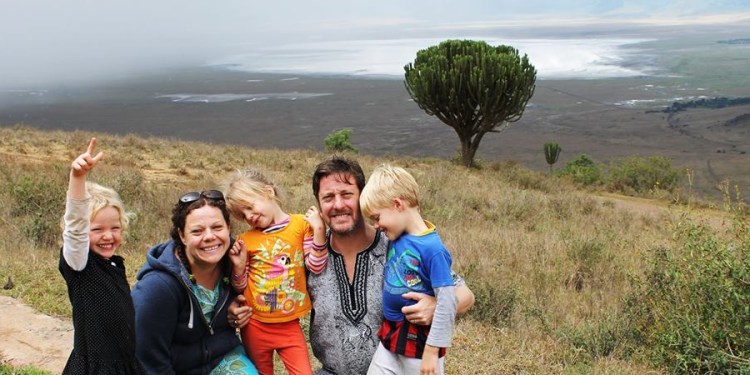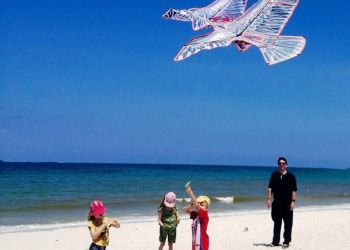Where are you from, what are you doing in Tanzania?
My name is Ali Dunnell and I am from England. I am working at an international school in Dar Es Salaam, teaching English and Art, and also helping with teacher's training.

What brought you to Tanzania, and how long have you been there?
To be honest, the idea of having an adventure brought me, my husband, and my family to Tanzania. I have done lots of independent travelling and both my husband and I have lived overseas before. We wanted our three children to be global citizens and have experience living abroad too, and the thought of living in Tanzania seemed really exciting to us. I have been in the country for nearly three years, two years in Mwanza and just under one year in Dar Es Salaam.
What is the process to move to Tanzania?
You need to obtain a work visa. This can be tricky to get, but your employer should be able to organize this before you arrive. You should check what the current situation is with regards to working in Tanzania, as, with a recent change in government, this is in the process of changing. Bureaucracy can be difficult here, and the Tanzanian authorities are pretty strict on immigration matters, so be careful.
What is your favourite thing about Tanzania, and what is your least favourite?
My favourite thing about Tanzania is the amount of colour – everything is brightly coloured from the clothes people wear, to the buses, the markets, the fruit, vegetables, the vegetation and the buildings – it is almost like someone has turned up the colour volume.
My least favourite thing is the unreliable postal system. Many things which people have sent to me have gone missing, which for me doesn't matter quite so much, but for my three young children it is heartbreaking.
How do you find the Tanzanian lifestyle?
Tanzanian life is simple. People wake with the sun and rest when the sun goes down. To be honest, I have found it pretty easy to adjust to most things, although I have found the constantly warm temperature of Dar difficult to adjust to. The food here is simple too – people mainly eat rice, potatoes, beans, vegetables, meat, eggs and fruit. If you want to eat a wider variety of food, you can, but you need to find a fancy supermarket and pay quite a bit more for the food. We have a mix of supermarket food and cheap local food.
How is the Tanzanian transportation system?
I have lived in two places in Tanzania, Mwanza and Dar Es Salaam. In both places I drove around. But the big difference between the two cities is that large parts of Dar Es Salaam are pretty much gridlocked everyday. This can be really frustrating, but you just need to plan it into your day, or travel out of rush hour. To get across to Dar from Kigamboni I use the passenger ferry and also use the Bajajes (three wheeled vehicles).
How is everyday life for you in Tanzania?
Everyday life in Tanzania is fairly laid back and easy going. My day consists of getting up at about 5.45am, making breakfast and pack lunches, then out to work for 7.00am. I usually finish my teaching day at 3.00pm, return home do some more work. Then, I help the children do their homework, while I make dinner. After the children have gone to bed, I usually read, watch the news, listen to podcasts or, if I'm not too tired, spend some time on my art work.
What do you do in your free time?
In my free time I like to go to the beach, where I like to read my book, swim or sometimes fly kites with the children. When out and about in Dar I enjoy eating in the many different restaurants or going to the cinema. At home I sketch and paint, play the piano and read. My husband also brought me an old fashioned manual sewing machine that I use to make simple clothes using the beautiful material you can buy in the markets here.
What new habits have you developed and what old habits have you quit in Tanzania?
The new habit I have developed living in Tanzania is the ability to cook more food from scratch because you don't have a large freezer or supermarkets close by. You also need to make things with what you have in the house, so my ability to make things like flatbreads, pittas, refried beans, hummus, guacamole, jams and chutneys has improved.
The old habit which I have quit since I have been in Tanzania is my early morning run. I used to like going for a run before my children woke up. However I find that really difficult to do here, as it is still dark at that time and I don't feel safe as a female running alone in the dark.
What is your opinion on the cost of living in Tanzania?
Tanzania is a very cheap place to live, if you eat locally and take local transport. However, if you want to eat imported foods, visit fancy restaurants, want to travel around the country or enjoy expat entertainment, you will pay much more.
For 25,000 Tsh (Tanzanian Shilling) (about 8 English pounds) you can travel for about 10 hours by bus. Travelling by small bus, like in one of the Dala Dala's (minibuses), around the city will cost about 5p or 10p for a journey. A bottle of beer costs on average about 2,500 Tsh (about 85p). And a loaf of bread is about 1,500 Tsh (about 50p).
What is something that you would like to do in Tanzania, but haven't had the opportunity to do yet?
I would love to try and climb Kilimanjaro, although I am not sure I would manage it! I would still like to visit both Pemba and Mafia, and also visit the ruins of Kilwa Kisiwani.
Share your most memorable experience in Tanzania.
While camping on the edge of the Ngorogoro Crater in Tanzania, I decided to wake up early to watch the sunrise. What I witnessed was nothing short of breathtaking. Snuggled up inside my hoodie and scarf, I sat alone, mesmerised by the changing horizon before me. I watched as the African sky changed from an abyss of black and midnight blue to a bright mix of amethyst and tangerine orange, and, as the sun began to rise, spears of light pierced through the clouds.
What do you think of the local cuisine? What is your favourite dish?
I love the fresh fruit you get here – the watermelon, pineapple and passion fruit. But my favourite Tanzanian dish without a shadow of a doubt is Chips Mayai, which is a chip omelette and it is one of Tanzania's favourite snacks and is sold on every street corner.
What do you miss the most about your home country?
I come from England, and am used to four different seasons in the year, but here the temperature doesn't really change. They have two seasons; the wet and the dry season. I miss the seasonal changes – the dramatic difference between a warm summers evening and a cold frosty morning and the change from summer to autumn, then to winter and the coming of spring.
What motivated you to create your blog 'Travels with my Art'?
The reason I started my blog was because I wanted to share my sketches, paintings and photographs, with friends and family back home. I always remember my sister saying she would like to know the story behind a painting or photo, so I decided to include more commentary on my blog. I also thought it would work well as an online gallery, where I could showcase my work, with a view to exhibiting or selling my work at a later date.
Give us some useful tips that soon-to-be expatriates in Tanzania will benefit from.
Don't be thwarted at the first hurdle in Tanzania. There will be frustrations with electricity and power, with bumpy roads and dodgy vehicles, obstinate traffic police and illnesses that knock you for six and then some more.
If you had to advise an expat on five items to bring with them to Tanzania, which would that be?
A surge protector, a wind up torch, a decent camera, oil/ acrylic paints/sketchbooks and waterproof black mascara.



















Contact us to be featured in the Interviews section.
Participate